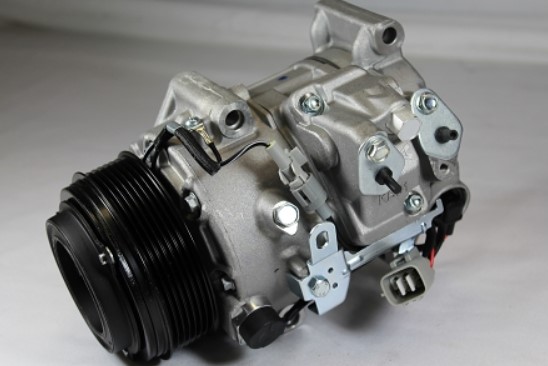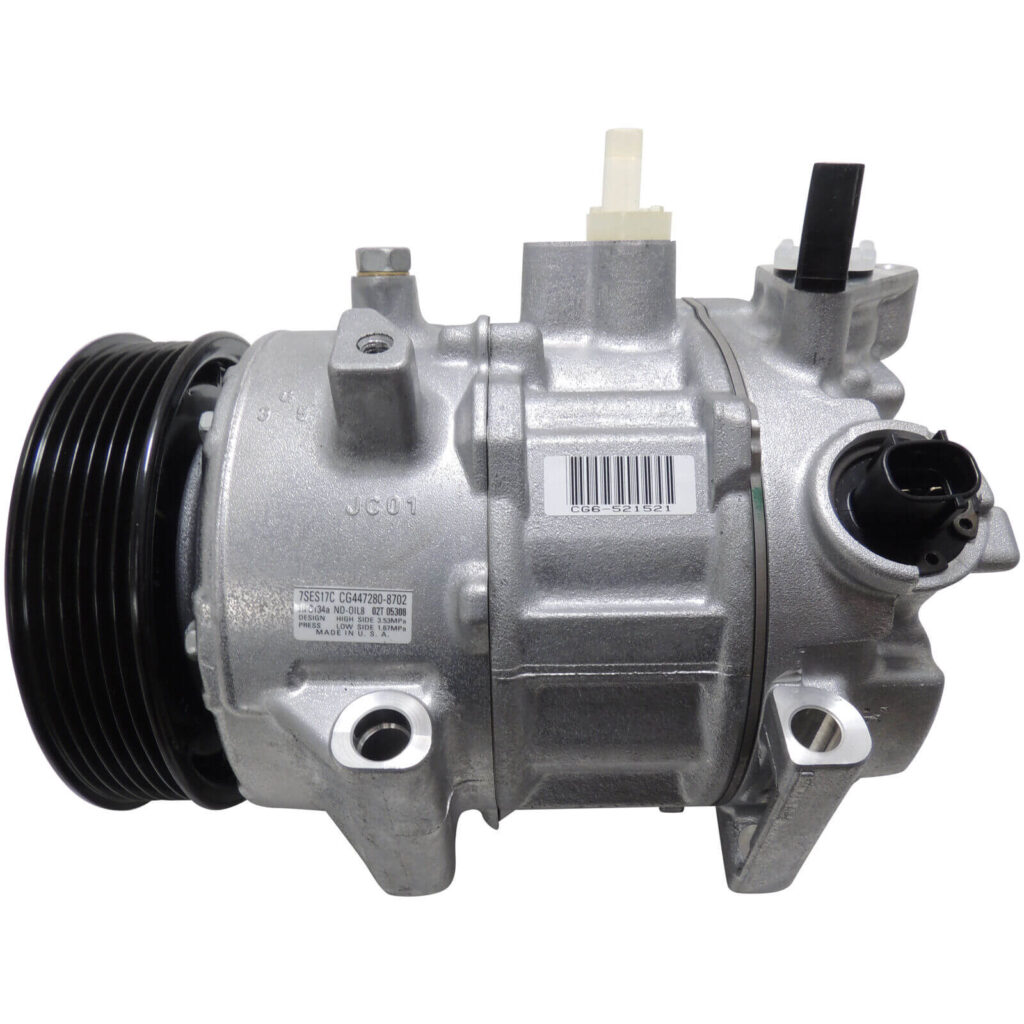Replacing the air compressor on a Toyota Highlander can be an expensive job. Depending on parts and labor costs, replacing this component could cost upwards of $700 to over $1,000.
This cost does not include any additional repairs that may need to be done or additional components that might need to be replaced.
If you have noticed your air conditioning is not working as it should, it’s important to get your vehicle checked out by a certified mechanic before the problem gets worse and more costly.
What makes a car AC compressor go bad?
A car AC compressor is a crucial component of the air conditioning system, responsible for circulating refrigerant to cool the air blown into the cabin. However, over time, various factors can contribute to its failure, leading to reduced cooling efficiency or a complete breakdown.
Here are some common causes of a bad car AC compressor:
- Low refrigerant levels: Proper refrigerant levels are essential for the compressor to function effectively. Low refrigerant can cause the compressor to work harder, leading to premature wear and tear. In extreme cases, the compressor may overheat and seize up due to excessive load.
- Dirty condenser: The condenser is responsible for removing heat from the refrigerant, allowing it to condense back into a liquid state. If the condenser becomes dirty or clogged with debris, it can hinder the heat transfer process, increasing the pressure on the compressor and potentially causing damage.
- Clogged evaporator coil: The evaporator coil is where the refrigerant turns into a gas, absorbing heat from the air inside the cabin. If the evaporator coil becomes clogged with dirt, dust, or mold, it restricts air flow and reduces cooling efficiency. This can strain the compressor, leading to premature wear.
- Faulty pressure sensors: Pressure sensors in the AC system monitor the refrigerant pressure and send signals to the compressor control module (CCM). If a pressure sensor is faulty or malfunctioning, it can send incorrect signals to the CCM, causing the compressor to operate in an incorrect manner, leading to damage.
- Lack of lubrication: The compressor’s bearings require proper lubrication to function smoothly and prevent excessive friction. If the lubrication oil becomes contaminated, depleted, or the wrong type is used, it can cause the bearings to wear prematurely, leading to compressor failure.
- Overloading: Repeatedly running the AC system at high temperatures or for extended periods can put excessive strain on the compressor. Overloading can cause the compressor to overheat and malfunction, ultimately leading to failure.
- Age and wear: Over time, the compressor’s internal components, such as the valves, seals, and pistons, can wear out due to regular usage and exposure to harsh conditions. This wear can lead to leaks, refrigerant loss, and compressor failure.
To prevent premature AC compressor failure, it’s essential to maintain the AC system regularly. Regularly check the refrigerant levels, clean the condenser and evaporator coils, and inspect the pressure sensors and lubrication oil levels.
Also, avoid overloading the system and avoid using the AC at excessive temperatures for extended periods.
By following these preventive measures, you can extend the lifespan of your car’s AC compressor and maintain optimal cooling efficiency.
Is It Worth Replacing Compressor on Car AC Unit?
Replacing the compressor in a car AC unit can be a costly endeavor, but it is worth it. The compressor is an essential part of the AC system, and without it, your car will no longer be able to cool down during hot summer days.
Compressors are responsible for pushing refrigerant through the system so that your vehicle’s air conditioning can work properly.
Over time, compressors tend to wear out due to age or lack of maintenance and need replacing before they fail completely.
Replacing a worn-out compressor quickly helps you avoid any potential issues with your air conditioning system, such as strange noises coming from under the hood or even damage caused by leaking refrigerant.
So if you start experiencing issues with your car’s AC, like weak airflow, warm air blowing, or higher than normal noise levels coming from under the hood. It’s best to get them checked as soon as possible and replace any faulty components, including the compressor, if required.
Doing this can save you money on repairs down the road and keep your car comfortable on those hot summer days!
Is Replacing a Car AC Compressor Expensive?
Replacing a car AC compressor can be an expensive proposition, depending on the type of vehicle you have. Generally speaking, it will cost anywhere from $400 to over $1,000 to have a new compressor installed by a professional mechanic.
This price range includes the cost of replacing any other necessary components and the labor involved in the installation process.
In addition to this initial expense, there may also be additional costs associated with having your refrigerant recharged or replaced, as well as any repairs needed due to damage caused by the faulty compressor. Furthermore, if your warranty doesn’t cover AC repairs, you’ll need to factor in that added expense as well.
All in all, it’s important for anyone considering getting their car’s AC compressor replaced to understand exactly what they’re getting into before committing financially, so they can make sure they get the best value out of their investment.
When replacing a car AC compressor what else should be replaced?
When replacing a car AC compressor, it is often recommended to replace the following components as well:
- Receiver/Dryer or Accumulator: These components filter and store refrigerant, and they can accumulate debris over time.
- Orifice Tube or Expansion Valve: Depending on your car’s system, one of these components controls the flow of refrigerant and may need replacement.
- Refrigerant: It’s common to evacuate and recharge the system with fresh refrigerant during a compressor replacement.
- O-rings and Seals: Over time, these can wear out, and it’s good practice to replace them to prevent refrigerant leaks.
- System Flushing: Cleaning the AC system by flushing out contaminants is recommended in some cases.
- Belt and Tensioner: Inspect the drive belt and tensioner for wear and replace them if necessary, as a failing belt can lead to compressor issues.
2008 Toyota Highlander AC compressor replacement cost
The average cost to replace the AC compressor in a 2008 Toyota Highlander is between $1,226 and $1,859. This range includes both parts and labor costs. The exact cost will vary depending on the mechanic, the location, and the specific model of the Highlander.
Here is a breakdown of the cost:
- Parts: $864 – $1,403
- Labor: $362 – $457
The labor costs are higher than the parts costs because the compressor is a difficult component to replace. It is located in the engine bay and is connected to several other parts of the AC system. The mechanic will need to remove the compressor, flush the AC system, and then install the new compressor.

How much does it cost to fix AC compressor in car?
The cost to fix an AC compressor in a car can vary depending on the make, model, and year of the vehicle, as well as the specific location of the compressor and the type of compressor being replaced. However, in general, the cost to replace an AC compressor typically ranges from $800 to $1,500.
What is the Life Expectancy of a Car AC Compressor?
The life expectancy of a car AC compressor depends on several factors, including the type of vehicle and how well it is maintained. Generally speaking, a high-quality compressor should last for approximately 10 years or 150,000 miles before needing replacement.
Of course, if your air conditioner isn’t used regularly during certain times or seasons, its lifespan may be extended even further.
Additionally, proper maintenance is essential to ensuring your car’s AC compressor remains in good working order for as long as possible; this includes regular cleaning and lubrication with approved products from time to time.
Poor maintenance can lead to decreased efficiency and a shortened lifespan for the unit overall, so make sure you adhere to any manufacturer recommendations for upkeep.
Toyota RAV4 AC Compressor Replacement Cost
The cost of replacing the AC compressor in a Toyota RAV4 can vary, but it generally ranges from $500 to $1,000 for the part and labor.
Factors influencing the cost include the model year, labor rates in your area, and whether you choose to use an original equipment manufacturer (OEM) or aftermarket compressor.
It’s advisable to obtain quotes from reputable auto repair shops for a more accurate estimate based on your specific circumstances.

Can I Drive My Car With a Bad AC Compressor?
It is typically not recommended to drive a car with a bad AC compressor. While the compressor may still be running, it will likely not provide any cooling and could lead to more harm in the long run. If you have an issue with your AC system, such as low coolant levels or leaky hoses, then these should be addressed before attempting to drive your car with a bad compressor.
Driving without air conditioning can also put additional strain on other components of the vehicle’s engine due to increased cabin temperature.
Additionally, driving without adequate air circulation from the AC unit can make for an uncomfortable ride in hot weather conditions. It’s best practice to get your car serviced and have its AC inspected by a qualified technician if you suspect that there is anything wrong with it.
How often do you need to replace the AC compressor in your car?
The frequency of AC compressor replacement in cars can vary depending on several factors, including the car’s make and model, driving habits, maintenance practices, and environmental conditions.
However, in general, AC compressors can last for a considerable period, often reaching 10-12 years or 150,000 to 200,000 miles under normal driving conditions.
Under favorable circumstances, some AC compressors may even last the lifetime of the vehicle. Regular maintenance, such as checking and maintaining refrigerant levels, cleaning the condenser and evaporator coils, and ensuring proper lubrication, can significantly extend the lifespan of the compressor.
Conclusion
In conclusion, replacing the AC compressor in a Toyota Highlander can be expensive, but it is an important part of maintaining your vehicle. With regular maintenance and careful attention to your vehicle’s needs, you can help prevent costly repairs like this one.
If you are experiencing problems with your AC compressor, consult with a certified mechanic for advice on how to best repair or replace the unit.
